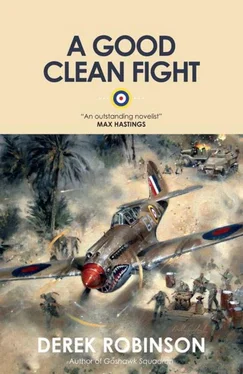If the Heinkel was down where Signals Intelligence said it was, it lay at the extreme range of the Kittyhawk. But Barton didn’t trust those fixes on forced landings. Direction-finding stations had to work very fast on poor signals from remote aircraft. They were lucky to get three bearings, and when they did, the three lines never met at one definite, unanimous point. They came together and crossed, and what they made was a small triangle. Then the operator usually split the difference and put the fix in the center of the triangle. It was the best he could do and it might be a long way from the truth of the matter: twenty, thirty, fifty miles from it. Barton had seen it happen. He had no confidence that Luftwaffe DF stations were any better than RAF ones.
If he had to go hunting for the Heinkel, Barton wanted plenty of leeway. He decided not to fly to the target area at three hundred miles an hour, which was a high cruising speed that drank the juice without thought for the morrow. Instead, he decided they would take off early, and fly slowly, and arrive with their tanks a damn sight more than half-full.
That was his plan, and it was why everyone was up two hours before dawn. Then came the gremlins.
When at last the Kittyhawks got off the ground, he climbed gradually to ten thousand feet and settled down with the airspeed indicator at two hundred miles an hour, a nice round figure which would get them there and, God willing, get them home again. Bletchley had promised the Commanding Officer of the Desert Air Force and the C-in-C Middle East and the Prime Minister and the King and Roosevelt and Stalin and the Mormon Tabernacle Choir that Fanny Barton and his intrepid Yankee wingman would race the Luftwaffe across the Sahara, destroy their bastard Heinkel, save the Takoradi Trail and win the war, even if it killed them. Well done, Baggy. You gave, and you did not stop to count the cost. You stayed behind and did not have to worry about returning.
Barton suddenly remembered Baggy saying: What a hypocritical young thug you are, Fanny, you don’t give a tiny toss for Takoradi, do you? It was true. So what did he care about? The squadron. Nothing else mattered. Uncle had once said the squadron never died, chaps came and chaps went, but the squadron never died. By God, never a truer word was spoken. To Barton, strapped tightly into his Kittyhawk, seemingly balanced and motionless at the top of a night sky, those men lived as vividly as if they sat in the cockpit. Greek George, for instance, had come into the mess and said, “Nobody stuffs Geraldo, Geraldo is my friend.” What had that been all about? Barton couldn’t remember. People said peculiar things in the mess. Who was it said he’d never seen a fly land on Butcher Bailey? Mick O’Hare, that’s who. Fighter pilots were such individuals, you never knew what they were going to say next. That night they were drinking rum, Pip Patterson had said, “I’m definitely going to murder my wife.” Was he serious? He’d sounded serious. Pip had always been serious. The great thing about the squadron was it didn’t matter if somebody didn’t make sense all the time. A chap was entitled to his funny ways and as long as he did his job properly, who cared? Four strafes in six days. Someone had said that. Who? Fido Doggart? Tiny Lush? Didn’t matter. Only the squadron mattered.
It was full daylight when they reached the map reference. The Luftwaffe DF stations had done quite well: the wreck was only five miles away. It stuck out like a dead fly on a white carpet.
They went down and buzzed it. Nothing moved. It was the most ripped-up, torn-apart wreck that Barton had ever seen.
Hooper saw the wheel tracks. “Heading east,” he said.
“Jerry got here first,” Barton said.
Following the tracks was child’s play: from a hundred feet they were as clear as tramlines. The trucks appeared on the horizon as soft blobs of black. Soon they began to make feathery tails of dust. Then the details emerged: wheels, canvas tops, cabs. Someone saw or heard the fighters coming, for suddenly the trucks turned away from each other. It was all too late. Barton strafed one, Hooper strafed the other. It was an old familiar routine and the streams of tracer chased and found their targets as if the trucks were magnets that wanted to be hit.
Both trucks were on fire after the first pass. The Kittyhawks came back and killed all the men who were running away. Some were aircrew, some were not. Hooper wasn’t concerned to distinguish. He had three .50-caliber machine guns in each wing and he gave the area a thorough hosing. If they were running, he killed them. If they were lying, he made sure they were dead. Barton did the same. Twelve machine guns killed everyone on the ground several times over. Toward the end, one of the trucks exploded. Hooper was not impressed. He had seen ambulances blow up with far greater effect.
CHAPTER NINE
Chaps Come and Go
The Benghazi blackout was less than perfect. Malplacket began to see specks of light perforating the night far ahead. He drove the Fiat off the road and stopped. “I need to pee,” he said.
“Again?”
“You have an objection?”
“Hell, no, you go ahead. Who am I to stand between a man and his bladder?”
When Malplacket came back he said, “We should have a plan. We’re sure to meet some kind of barrier. What do we say then? Who do we claim we are?”
“What do we look like?”
“Two middle-aged German officers in dirty uniforms.”
“Then that’s what we are. We play it by ear, my friend. That’s our plan. You got a better one?” Lester reached across and turned the ignition key. For the first time in years he was free. Life was an adventure. He wanted action.
Malplacket eased the car back on the road and cautiously put on speed. He was driving, not because he was a good driver, but because he was sure that Lester would be a reckless one. The headlights were dimmed with metal grills and their beams made only a small dent in the darkness. He was afraid of running into something: a truck parked without lights, a squad of soldiers on the march, he didn’t know what. His feet danced gingerly on the pedals. In the end, something nearly ran into him. A blare like a monster foghorn erupted close behind the Fiat and both men jumped as if stung. Malplacket’s foot slammed and the rear wheels spun, gripped and flung the car away from this deafening threat. Lester turned and looked back. “It’s a truck,” he said. “Jesus, it’s big as a goddamn house.” Malplacket said nothing. Soon his fingers ached from squeezing the wheel. Once, he almost ran out of road and the wheels jolted and bounced on broken tarmac. “Hey, hey!” Lester complained. His voice shook like jelly.
“I can’t see him.” Malplacket’s eyes were flickering to and from the wing mirror. “Is he still behind us?”
“Slow down. Pull over, let him pass, for Christ’s sake.”
“I can’t pull over, not at this speed. What’s that ?”
Lester turned and looked at the road ahead. He saw a small red glow, magnifying rapidly. “Tail light!” he shouted, and snatched the handbrake. Malplacket was flung forward. His face whacked the top of the steering wheel. The Fiat drifted crabwise across the road leaving four tracks of hot rubber. It bucketed up the bank and stalled with a crush of bushes choking the chassis.
“Oooh,” Malplacket said. “Ow.” The sounds were juvenile, they could not describe his serious pain, but they were the best his voice could do. “Oh, oh.” It sounded like somebody else’s voice. He wished it were somebody else’s pain.
Lester found a flashlight.
“You took a smack on the hooter, looks like.” Blood was rippling down Malplacket’s upper lip and chin. “That great schnoz of yours is a couple of sizes bigger than it was.”
Читать дальше












